Protecting your family and your community is the number one reason to safely store and dispose of your medications. Safe storage is easy! When you’re finished using your medication, dispose of it promptly at a permanent disposal site, bring it to a Take Back Event, or utilize a home disposal option. Learn how to safely dispose of other medical supplies such as sharps and liquids. Get involved with our disposal programs such as hosting a Take Back Event or applying for a fully funded, permanent medication take back box for your organization. Be sure to check out our educational resources and evidence behind our safe storage and disposal initiative.
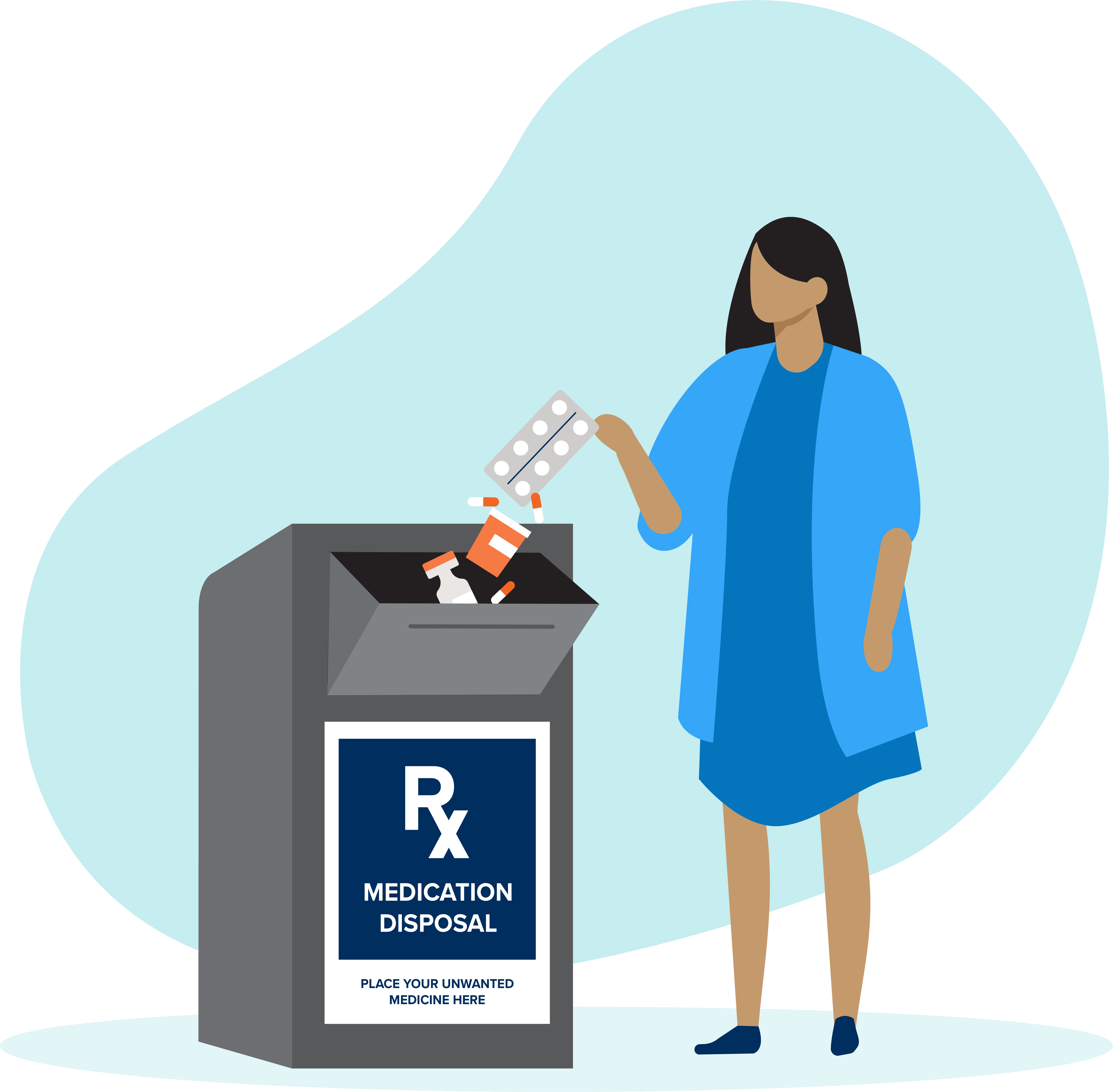
Protecting your family and your community is the number one reason to safely store and dispose of your medications.
 | Every 10 minutes a child visits the emergency room for medication poisoning.1 |
 | Three in five teens say prescription medication is easy to get from their parents’ medicine cabinet. |
| 9.2 million people ages 12 and older have misused opioids in the past year.2 | |
 | Among people aged 12 or older who misused pain relievers in the past year, half of them indicated that they obtained the pain relievers they misused from a friend or relative.3 |
 | 3 of 4 people who use heroin started with prescription opioids.4 |
Locking pill bottles are designed to provide an added layer of security for medications. They can be particularly useful for several reasons, including:
Preventing accidental poisoning: Keeping medications in a locking bottle can prevent children, teens or pets from accidentally ingesting pills that could be toxic or deadly.
Reducing risk for misuse and diversion: Controlled substances or other medications with a higher potential for misuse, such as prescription painkillers or psychoactive medications, can be secured and deter unauthorized access.
Maintaining medication integrity: Locking containers can help protect medications from environmental factors, such as moisture or sunlight, which could potentially degrade their effectiveness.
Ensuring correct dosage: For individuals who may be confused about their medication regimen, a locked bottle with a timer or some other form of control can prevent double-dosing or skipping doses.
Maintaining privacy: Some individuals may want to keep their medications private, either due to the stigma associated with certain treatments or for personal reasons. A locking bottle can provide that privacy.
Protecting vulnerable individuals: In homes with individuals who may be at risk of self-harm or have cognitive impairments, securing medication is a vital safety measure.
Compliance with regulations: In some areas, there may be legal requirements or guidelines that stipulate how controlled substances must be stored. A locking pill bottle can help ensure compliance with these regulations.
Travel safety: When traveling, a locking pill bottle can protect medications from being lost or stolen, and ensure that you have access to your medication when you need it.
Psychological deterrent: An additional step required to unlocking pill bottles, could provide vital time needed to reconsider and deter an individual from taking a medication on impulse.
It’s important to remember that while locking pill bottles can provide a level of security, they are not foolproof and should be used as part of a broader strategy of medication safety and management.
There are several known risks of opioid use, including side effects, accidental medication poisoning, intentional medication misuse, development of opioid use disorder, and opioid overdose. Safe medication disposal can help prevent harm from opioid exposure. When you get a prescription, consider having a conversation with your provider about safe storage and disposal options.
If you have any medications – including opioids – that are no longer needed, these should be safely disposed of as soon as possible. The best options are to use the at-home disposal options of a deactivation bag or a mail-back envelope, or to bring the medications to a permanent disposal location in your community. If these supplies are not available to you, the next best option is returning medications at an upcoming local take back event. If none of these options are accessible, you can mix medications with coffee grounds or cat litter and dispose of them in the garbage; note that this does not deactivate the medications. If absolutely necessary, medications can be flushed down the toilet; this method has environmental concerns and does not deactivate the medications, but it can be considered as a last resort to keep you and your family safe from opioid exposure.
OPEN can help with safely disposing medications through our current disposal programs.

Talk with your pharmacist about home disposal options such as medication deactivation bags and mail back envelopes.

Pharmacies, police stations, and hospitals are sites that commonly accept unneeded medications. Use the Household Drug Take Back Map or search “medication disposal near me” in an internet browser to locate permanent disposal locations in your community.
EpiPens, sharps, and inhalers require additional disposal precautions and are not always accepted at disposal sites.
We recommend calling your local disposal site to confirm their hours and the items they accept for disposal.
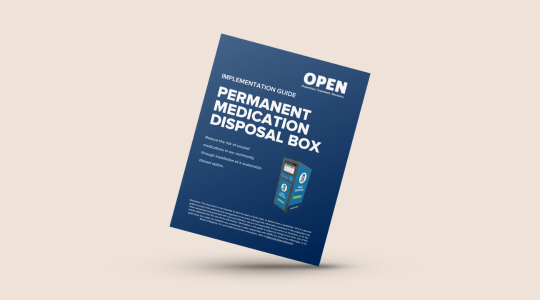
Learn how to implement a permanent medication disposal box program in your community.
OPEN supports biannual medication take back events in the spring and fall. Through partnerships with law enforcement and community health organizations, we are able to support Take Back Events across the state of Michigan. Typically the event day matches National Prescription Drug Take Back Day.
Sign up for the Take Back Event program or subscribe to the OPEN newsletter for more information. About two months before the event, OPEN will create specific event pages with information for hosting. OPEN can support ordering disposal boxes for your event and provide planning resources, including our Medication Take Back Event Guide.
Check out these events: Spring 2023, Fall 2022, Spring 2022!
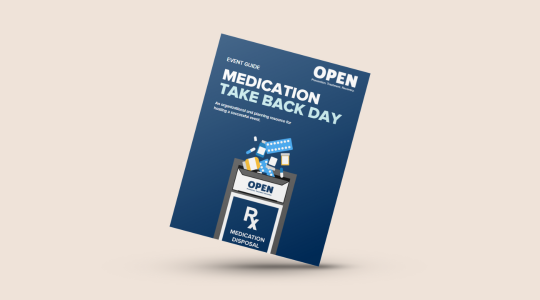
Learn how to successfully host a Medication Take Back Event in your community.
Get involved with one of our Safe Storage and Disposal programs! Join us for one of the DEA’s biannual Take Back Events, explore handing out mail-back envelopes or Deterra bags, apply to have a permanent medication disposal box installed, or pass out locking pill bottles to your community. There are plenty of ways to get involved and help educate your community!
Medications are often administered using medical devices or used alongside medical supplies. Needles might be used to inject medications or draw medications from bottles, syringes could be used to give oral or intranasal medications, or patches could be used to give medications through the skin. Some medications come in different forms, like breathing medications that come in inhalers or children’s medications that come as liquids. These medications might need to be disposed of differently than pills, capsules, or tablets. Continue reading below to find out more about how to safely dispose of different kinds of medications and supplies.
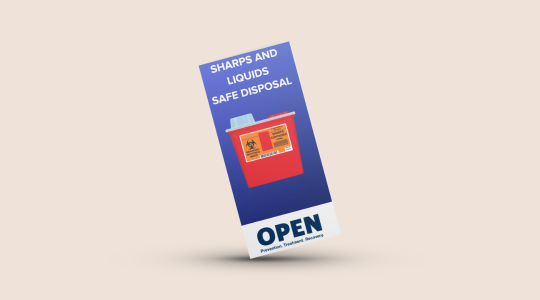
Learn how to safely dispose of needles, lancets, and liquid medications.

Learn how to safely dispose of needles, lancets, and liquid medications.

Learn how to successfully host a Medication Take Back Event in your community.

Learn how to implement a permanent medication disposal box program in your community.
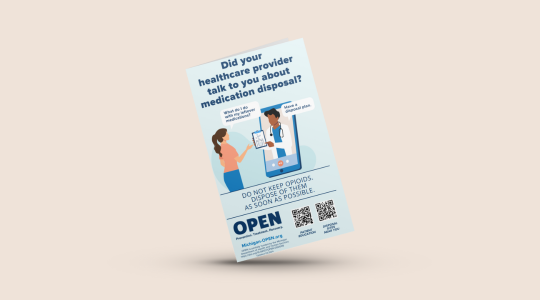
Learn how to facilitate discussion on safe disposal of unused opioids with your healthcare provider.